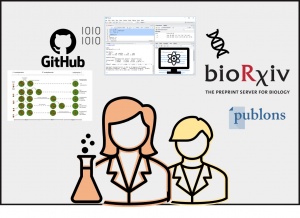Objectives
The objective of this course is to provide participants with basic knowledge on a) the fundamental aspects of experimental design and b) workflows, platforms and tools to increase reproducibility at all scientific levels.
Topics:
- Why is a clear experimental design important?
- Key aspects of experimental design.
- Estimation of sample size.
- Why is reproducibility in science important?
- Working with Github.
- Data processing workflows.
- Notebooks (R and Jupyter).
- Manuscript and data repositories.
This course can have a recognition of 6 ECTs for FCUL PhD students enrolling in it as part of their first doctoral year. These students need to deliver two reports after the course. For students only requiring 5 ECTs recognized in their specific PhD programmes the last 3.5 hours of the course are not mandatory, they need to deliver only the main report and the certificate will be on 'Topics in Experimental Design and Reproducibility in Science’. Such report(s) are also advised for other students requesting creditation of the course in their institutions.
Minimum formation: - Bachelor’s degree in biology or related areas. No previous knowledge is necessary.
Directed to: PhD or MSc students in Biology or related areas, postdocs and other professionals working in related areas
General Plan
Detailed Plan:
- Why is a clear experimental design important? We will highlight the importance of correctly planning an experiment to avoid taking wrong conclusions and benefit the most from the data collected.
- Key aspects of experimental design: Participants will learn how to define variables and establish protocols starting from a clearly defined question.
- Estimation of sample size: Participants will learn how to use power analysis.
- Why reproducibility is important: We will go through the reasons why is it important to keep our research reproducible for others and for ourselves.
- Working with Github: Participants will become familiar with the use of Github as a tool to detail steps of data analysis and data processing and even manuscript writing.
- Data processing workflows: Participants will become familiar with different workflows that allow to create reproducible steps in data processing using open-source tools.
- Notebooks (R and Jupyter): Using two of the most common scripting languages in biology, participants will see how notebooks can be used to create fully automated and reproducible analyses.
- Manuscript and data repositories: We will discuss the advantages of sharing documents in these types of platforms.
- Participants will be given an exercise in which to apply the acquired knowledge on experimental design and reproducibility.
Funding
Students fees
Partners
n.a.
Fee
Free for 1st year PhD students in Doctoral programmes at FCUL (e.g. Biologia), Biodiversity, Genetics and Evolution (BIODIV UL; UP), Biology and Ecology of Global Changes (BEAG UL, UA) and Sustainability Science (UL, several institutions), when the course counts credits for their formation, in which case the delivery of a final report done after the course is mandatory; the course is also free for more advanced PhD students of the BIODIV programme (ULisboa or UPorto); 50 € for more advanced PhD students of cE3c; 80 € for PhD students of the PEERS network (CFE); 125 € for FCUL Master students and unemployed; 180 € for BTI, BI and other PhD students; 250 € for Professional and postdocs.
When the maximum number of students is reached, 12 vacancies will be available for non-paying 1st year PhD students mentioned above, being, by order of preference students from: 1) cE3c; 2) BIODIV (not from cE3c); 3) FCUL (not from cE3c); 4) Sustainability Science (not from cE3c or FCUL); 5) BEAG (not from cE3c or FCUL).
Candidates should send a short CV and a motivation letter to Inês Fragata (irfragata@gmail.com), Diogo Godinho (diogoprinogodinho@hotmail.com) and Leonor Rodrigues (alrodrigues@fc.ul.pt). The cv and letter should be named as 1st-lastNAME-CV.pdf and 1st-lastNAME-ML.pdf (that is personalize the name of each file with your first and last name).
In the email please add the following information:
Full Name:
E-mail:
Phone:
Professional activity: Professional/Postdoc, BTI, BI (or other non-post-doc research grant), PhD student (with/ without scholarship), Lic. (Bachelor)/Master student
PhD student of the 1st year of a Doctoral programme at FCUL, BIODIV (FCUL/FCUP), or BEAG (FCUL or UA)?
If yes to the above question, PhD student doing the Course to count credits for 1st year?:
PhD student of cE3c or CEF (Centro de Ecologia Funcional)?:
Name of the PhD programme:
irfragata@gmail.com

